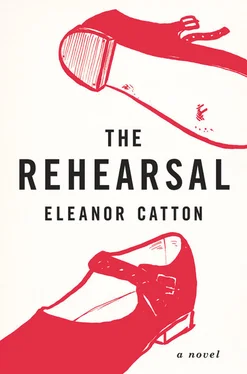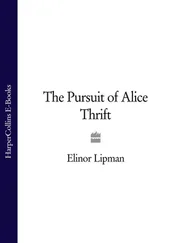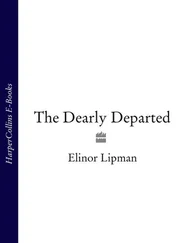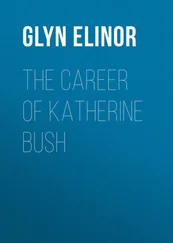August
“How long are you in town for?” Stanley asked after they had ordered. His father was busy scratching something into his electronic notebook and he didn’t answer immediately. He stabbed at the screen, folded the notebook away, and shook out his cuffs.
“Sorry, champ,” he said. “You said?”
“How long are you down for?”
“Just the weekend. I’m speaking at the conference tomorrow and then we fly out. I’ve got a joke for you. What’s the difference between acne and a Catholic priest?”
“I don’t know,” said Stanley.
“Acne only comes on your face after puberty.”
“Dad, that’s revolting,” Stanley said. He thought, A taboo is something that’s forbidden because it’s sacred.
His father held up his hands in surrender. “Too far?”
“Yes,” Stanley said. Or because it’s disgusting. He scowled despite himself and took a drink of water.
“Tell me about you, then,” his father said. “Tell me about drama school. Oh! I forgot—I’ve got something for you. I cut it out of the newspaper this morning.” He thumbed through his briefcase until he found a wad of newspaper, folded in eighths. He passed it across the table to Stanley and hummed merrily as he waited for Stanley to read it.
The headline read Girl’s Death “Terrible Waste .” The article was brief.
“You know the girl?” his father said when he’d finished. He was expectant, his eyes the gleeful half-moons of the laughing Comedy mask in the foyer of the Institute.
Stanley looked at the article again, and swallowed. “You’re going to tell me that this was the million-dollar girl.”
His father laughed. “Stanley,” he said, “this was the million-dollar girl. Did you know her?”
“What if I did?” Stanley said. “What if I did, and this was how I found out, and you’ve just been horribly insensitive to both of us?”
Stanley’s father reached across to twitch the page out of Stanley’s hands. “It’s just a bit of fun,” he said, tucking the wad back into his briefcase. “I thought you’d laugh. Don’t look at me like that.”
He shook his finger playfully at Stanley, and reached for his tumbler. “Anyway, if you did know her,” he said, “then I’d be congratulating you, because you’d have picked her from the start and you’d have taken out a policy.”
“That girl is a real person somewhere,” Stanley said.
“That girl is a corpse somewhere,” his father corrected. He gave Stanley a stern critical look, as if gravely disappointed and seeing him truly for the first time. He said, “I really thought you’d laugh.”
Monday
The catchment area for Abbey Grange is wide and economically diverse. It is close enough to the city center to touch some of the wealthier areas, but covers several suburbs of middling value and a few streets at its nether edge that properly belong in the backwater suburbs, wide crawling streets with vast gutters and unkempt grass.
The poorer girls who work part-time in fast-food and clothing chain stores are able to effect something of a moral victory over the girls who receive an allowance from their parents and don’t have to work for cash. When the less wealthy girls visit the white and shining houses of the rich they always come armed with a strong sense of entitlement, opening the fridge and changing the channel and taking long delicious showers in the morning, always with a guiltless and even pious sense of righting some dreadful inequality in the world. It is almost a noble thing to cajole and thieve half a bag of crisps from a girl whose pantry is lit by angled halogen bulbs anchored to a chrome bar: it is not a burglary but a form of just redistribution, a restoration of a kind of balance. So the poorer girls tell themselves, as they close their salty fists around their next mouthful and remark out loud that they are rostered on to work the late shift at the candy bar tonight.
The richer girls are made to feel ashamed of their parents’ wealth by these subtle insidious means, and so they begin to overcompensate in justifying the incremented luxuries of their lives, defending each indulgence in terms of sole necessity. “We have to have fresh stone fruit because of Mum’s diet plan,” they say, or, “I have to have my own car because Dad’s away on business so much,” or, “We only had the spa put in because Dad’s got a bad back.” The repeated validations become their mantra, and soon the richer girls begin to believe the things they are compelled by shame to say. They come to believe that their needs are simply keener, more specialized, more urgent than the needs of the girls who queue outside the chippy and tuck the greasy package down their shirts for the walk home. They do not regard themselves as privileged and fortunate. They regard themselves as people whose needs are aptly and deservedly met, and if you were to call them wealthy they would raise their eyebrows and blink, and say, “Well, it’s not like we’re starving or anything, but we’re definitely not rich .”
This stubborn dance of entitlement, aggressive and defensive, does mark a real fear in the collective mind of the Abbey Grange girls who have moved through the years of high school in an unchanging, unitary pack. Always they fear that one of them might at any time burst out and eclipse the others, that the group might suddenly and irreparably be plunged into her shadow, that the tacit allegiance to fairness and middling equality held by them all might come to nothing after all. In a group their economic differences even out to an ordinary average, and their combined mediocrity becomes something a little like power, each of them with a specialized function that defines her territory within the whole. But if one of them should burst out and shine, the remaining girls would wither. They are mindful of the threat, clinging to each other’s elbows and clustering bluishly in the corridor and reining in any girl who threatens independence—any girl who looks as if she might one day break free and have no need of the rest.
It is just such a group that Victoria rent apart and destroyed when she peeled off to pursue a love affair in such a selfish, secret way. In usual practice, boys are privately met and managed but always remain the collective property of the group: afterward, a girl might talk only to her best friend—or perhaps a close few, according to her own network of allegiances and feuds—but it is at least accepted that she will tell somebody , that the boy will remain an object beyond the myriad confidences of the group, a thing to discuss but never confide in, never to trust. Victoria’s violation of these rules is crippling and total. To have conducted an entire relationship in secret, to have invented commitments and appointments and, above all, to have trusted in Mr. Saladin over this nuggeted faction of girls who depend so utterly upon togetherness: her betrayal weakens the kaleidoscope stronghold of the group, leeches everything of joy and meaning, punctures every illusion of unity and might. The girls begin to shrink away from each other. Even the St. Sylvester boys seem tame and foolish, like dress-up soldiers waving cardboard swords.
“It isn’t fair,” is what the girls are thinking, all the left-behind eclipsed girls who squat in the dark of Victoria’s shadow and stew. “What she stole from us. It isn’t fair.”
Monday
Isolde wonders whether what she is feeling is merely a kind of worship, a fascinated admiration of an older girl such as she once bestowed upon Victoria and her scornful train of friends: forever desperate to please them, clinging to their ankles like a foreshortened afternoon shadow, and breathless with the impossible hope that they might one day count her among their closest. Is Julia really only a mirror image of the person who Isolde aspires to be—worldly, senior, brooding, debonair? Is this all her attraction is—a narcissistic self-congratulation, a girl captivated by the image of a girl? Does falling in love with Julia require Isolde to fall, to some degree, in love with herself?
Читать дальше












